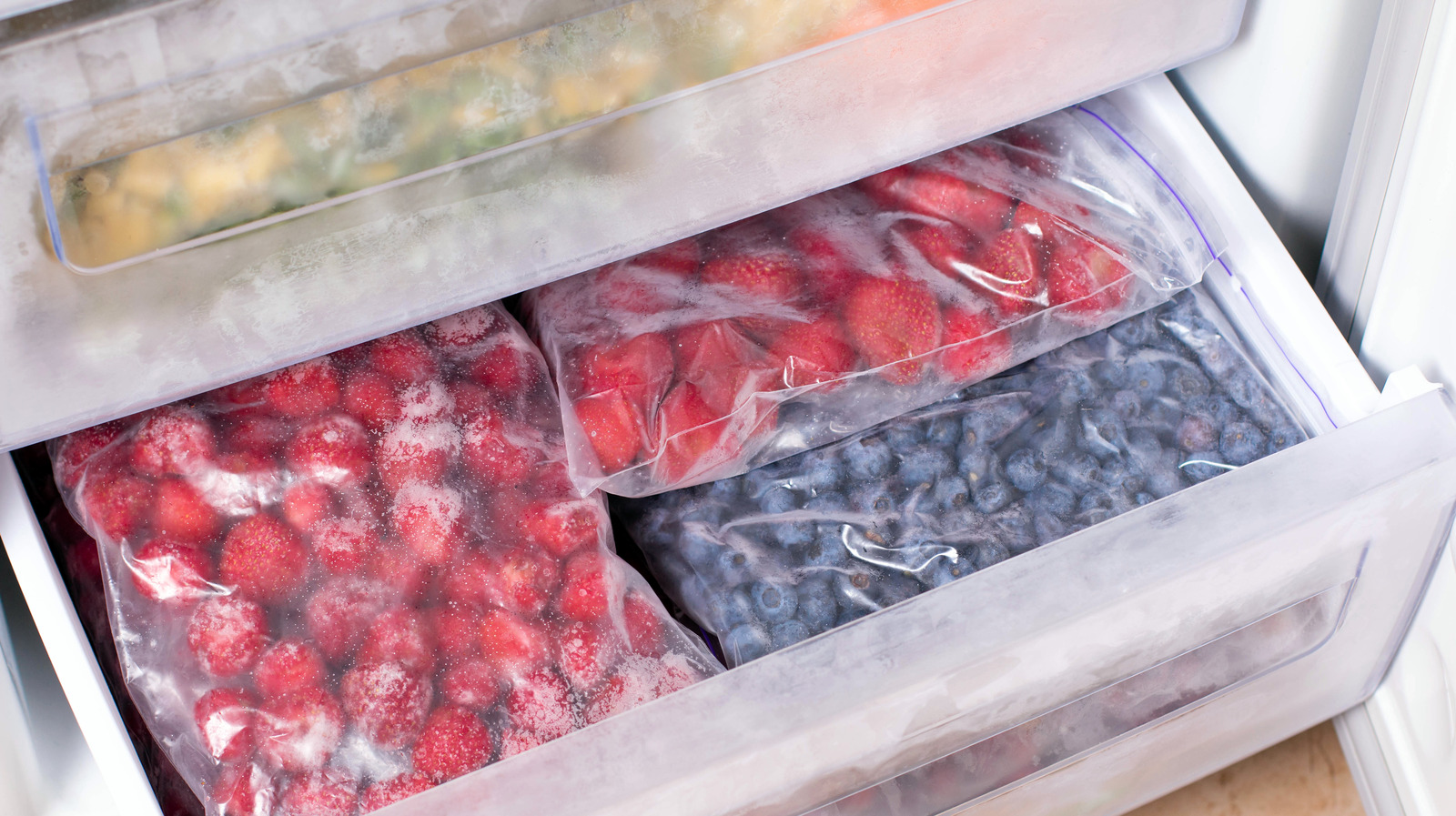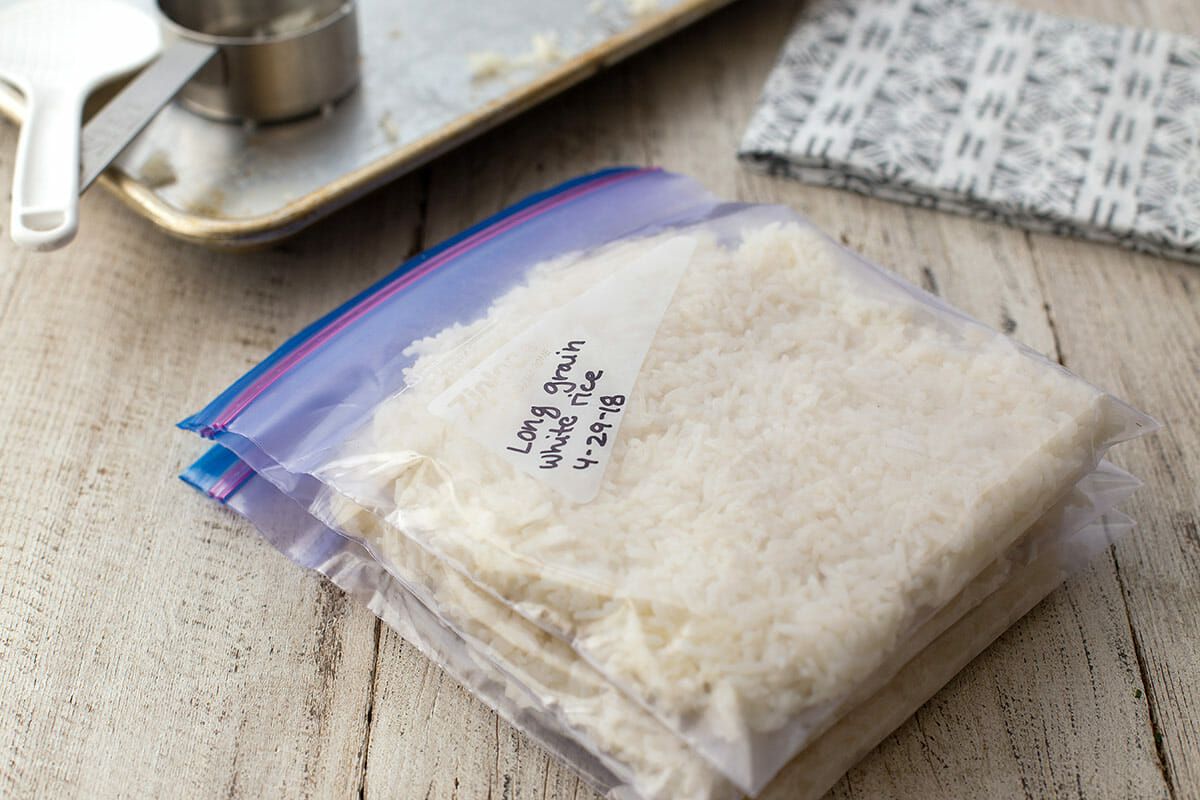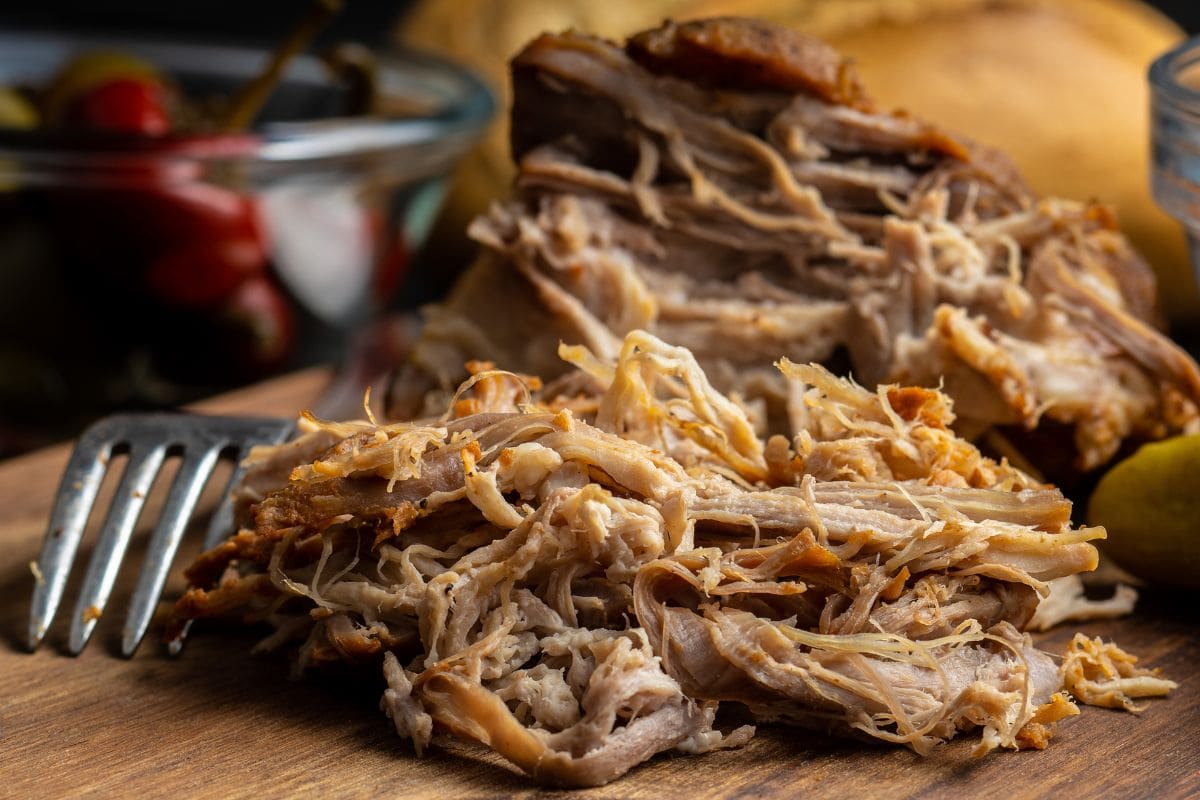Home>Articles>How Long Does Frozen Fruit Last In The Freezer


Articles
How Long Does Frozen Fruit Last In The Freezer
Modified: February 27, 2024
Discover how long frozen fruit can last in the freezer with this informative article. Find out the best practices for storing and preserving your favorite fruits.
(Many of the links in this article redirect to a specific reviewed product. Your purchase of these products through affiliate links helps to generate commission for Storables.com, at no extra cost. Learn more)
Introduction
Welcome to our comprehensive guide on frozen fruit and how long it can last in the freezer! Freezing fruit is a fantastic way to preserve its freshness and enjoy it year-round, even when it’s out of season. Whether you are a fan of smoothies, desserts, or simply want to have a healthy snack option readily available, frozen fruit can be incredibly convenient.
In this article, we will explore the factors that can affect the shelf life of frozen fruit, provide tips on how to properly freeze fruit, discuss recommended freezing times for different types of fruit, identify signs of freezer burn and spoilage, and highlight the benefits and uses of frozen fruit.
If you’ve ever wondered how long your frozen fruit will last, how to prevent freezer burn, or how to make the most of your frozen fruit supply, this guide is for you. Let’s dive in!
Key Takeaways:
- Preserve the freshness and flavor of your favorite fruits year-round by understanding the factors affecting frozen fruit shelf life, proper freezing techniques, and recommended freezing times for different types of fruit.
- Frozen fruit offers convenience, nutritional value, and versatility in culinary applications, making it a convenient and delicious option for various culinary endeavors.
Factors Affecting the Shelf Life of Frozen Fruit
When it comes to freezing fruit, there are several factors that can impact its shelf life. Understanding these factors can help you better preserve the quality and taste of your frozen fruit. Let’s take a closer look at the key factors:
Temperature
The temperature at which you store your frozen fruit plays a crucial role in determining its shelf life. Ideally, the freezer temperature should be set at or below 0°F (-18°C). Maintaining a consistently low temperature ensures that the fruit stays frozen and prevents the growth of bacteria and other microorganisms that can cause spoilage.
Packaging
The way you package your frozen fruit is important for preserving its texture and flavor. It is recommended to use airtight containers or freezer bags to prevent air and moisture from seeping in. Oxygen exposure can lead to freezer burn and degradation of the fruit’s quality. Make sure to remove any excess air from the packaging to minimize the risk of freezer burn.
Fruit Variety
Not all fruits freeze equally well. Some fruits like berries, cherries, and grapes are particularly suitable for freezing due to their high water content and sturdy structure. On the other hand, fruits with high water content and delicate textures, such as melons and peaches, may not retain their texture and flavor as well after freezing. It’s important to consider the characteristics of the fruit you intend to freeze to ensure the best results.
Read more: How To Store Frozen Fruit In Freezer
Level of Ripeness
The ripeness of the fruit when it is frozen can also affect its shelf life. It is generally recommended to freeze fruit when it is at its peak ripeness. Overripe fruits might become mushy and lose their texture during the freezing process, while underripe fruits may not develop their full flavor after thawing. Aim to freeze fruit when it is ripe but still firm for the best results.
By taking these factors into account, you can maximize the shelf life of your frozen fruit and ensure that it maintains its quality and taste for an extended period.
How to Properly Freeze Fruit
Properly freezing fruit is essential to maintain its quality and preserve its flavors. Follow these steps to ensure that your frozen fruit stays fresh and delicious:
Selecting Ripe and Fresh Fruit
When choosing fruit to freeze, opt for ripe and fresh produce. Ripe fruit not only has a better flavor but also freezes more successfully. Look for fruits that are firm, vibrant in color, and free from blemishes or bruises. If possible, pick your own fruit or purchase it from a local farmers market to ensure maximum freshness.
Preparing the Fruit
Before freezing, it’s important to properly prepare the fruit to maintain its quality. Start by washing the fruit thoroughly under cold water to remove any dirt or debris. For larger fruits like peaches or apples, consider peeling or slicing them into smaller pieces. Remove any inedible parts such as stems, cores, or seeds. You can also blanch certain fruits like peaches or berries to help preserve their texture and color, although this step is optional.
Packaging Techniques
Proper packaging is key to prevent freezer burn and maintain the flavor and texture of your frozen fruit. Here are a few techniques you can use:
- Use airtight containers: Choose containers specifically designed for freezing, such as freezer-safe plastic containers or glass jars with tight-fitting lids. Make sure they are clean and in good condition.
- Freezer bags: Alternatively, you can use freezer bags. Squeeze out any excess air before sealing the bag to minimize the risk of freezer burn. It’s also a good idea to double-bag the fruit to provide an extra layer of protection.
- Labeling: Don’t forget to label your packages with the name of the fruit and the date of freezing. This will help you keep track of the freshness and easily identify the contents in your freezer.
For best results, pack the fruit in small portions that you are likely to use in one go. This prevents you from having to thaw and refreeze the fruit, which can potentially impact its quality. Place the packaged fruit in the coldest part of your freezer, ensuring that the temperature remains consistently low.
By following these steps, you can ensure that your frozen fruit retains its taste, texture, and nutritional value, making it a convenient and delicious option for various culinary endeavors.
Recommended Freezing Times for Different Types of Fruit
Depending on the type of fruit, the recommended freezing time may vary. Here’s a guide to help you understand the ideal freezing times for different types of fruit:
Berries
Berries such as strawberries, blueberries, raspberries, and blackberries freeze well and can be stored for an extended period. Simply wash and dry the berries, then spread them out on a baking sheet in a single layer. Place the baking sheet in the freezer for about 2-3 hours until the berries are frozen. Once frozen, transfer them to freezer bags or containers, removing any excess air, and return them to the freezer.
Citrus Fruits
Citrus fruits like oranges, lemons, and limes can also be successfully frozen. Start by washing and drying the fruit. Then, you have a few options: you can slice the citrus fruits and freeze the slices individually on a baking sheet before transferring them to freezer bags, or you can juice the fruit and freeze the juice in ice cube trays. Both methods allow for easy portioning and use in recipes or beverages whenever needed.
Read more: How Long Does Milk Last In The Freezer
Stone Fruits
Stone fruits, such as peaches, plums, and cherries, can be frozen to enjoy their sweet flavors all year round. Start by washing and preparing the fruit as desired (peeling and slicing, if preferred). To prevent browning, you can dip them in a mixture of lemon juice and water. Arrange the prepared fruit in a single layer on a baking sheet and freeze for about 2-3 hours. Once the fruit is partially frozen, transfer them to freezer bags or containers and store them in the freezer.
Apples and Pears
Apples and pears can be frozen for various uses like baking, making sauces, or adding to smoothies. Wash, peel, and slice the fruit, removing any cores or seeds. You can blanch the slices in boiling water briefly to preserve their texture and color, but this step is optional. Place the slices in a single layer on a baking sheet and freeze for a few hours. Once partially frozen, transfer them to freezer bags or containers and store them in the freezer.
Tropical Fruits
Tropical fruits like mangoes, pineapples, and bananas can also be frozen successfully. For mangoes and pineapples, peel and chop them into desired sizes before freezing. Bananas can be frozen whole or sliced. If you plan to use the bananas for smoothies or baking, peeling and slicing them before freezing makes them easier to work with. Place the fruit in a single layer on a baking sheet and freeze for a few hours. Once partially frozen, transfer them to freezer bags or containers.
Grapes
Grapes freeze exceptionally well, and frozen grapes make for a refreshing and healthy snack. Simply wash and dry the grapes, then spread them out on a baking sheet in a single layer. Freeze the grapes for about 2-3 hours until they are firm. Once frozen, transfer them to freezer bags or containers and store in the freezer.
Read more: How Long Does Lasagna Last In The Freezer
Melons
Melons like watermelon, cantaloupe, and honeydew can be frozen, although their texture will change slightly after thawing. Remove the rind and seeds, then cut the flesh into chunks or use a melon baller to create small pieces. Arrange the pieces in a single layer on a baking sheet and freeze for a few hours. Once partially frozen, transfer them to freezer bags or containers.
Miscellaneous Fruits
Other fruits, such as figs, kiwis, and pomegranates, can also be frozen. Wash, peel (if applicable), and slice or prepare them as desired. Arrange the fruit pieces in a single layer on a baking sheet and freeze for a few hours. Once partially frozen, transfer them to freezer bags or containers.
By following these recommended freezing times, you can ensure that your frozen fruit maintains its texture, flavor, and nutritional value until you’re ready to use it.
Signs of Freezer Burn and Spoilage
While properly stored frozen fruit can last for months, it’s important to be aware of signs that indicate freezer burn or spoilage. Freezer burn occurs when the frozen food is exposed to air, causing it to become dehydrated and develop off-flavors. Here are some signs to watch out for:
Changes in Color and Texture
One of the most noticeable signs of freezer burn is a change in the color and texture of the fruit. Freezer-burned fruit may appear discolored, with whitish or grayish spots on its surface. The texture can become dry, leathery, or mushy. If you notice any significant changes in the appearance or texture of the fruit, it’s likely that it has been affected by freezer burn.
Read more: How Long Does Coffee Last In Freezer
Off Smells
Another indicator of spoilage is an off or unusual smell. If the fruit emits a distinct odor that is different from its normal aroma or smells sour or rancid, it is likely spoiled. Trust your senses and discard any fruit that has an unpleasant smell, as it may indicate bacterial growth or spoilage.
Taste Alterations
Freezer-burned fruit may also have a noticeable change in taste. It can taste bland, stale, or have a strange, off-flavor. The loss of moisture in freezer-burned fruit can affect its overall taste and make it less appealing. If the fruit no longer tastes fresh or has a taste that is different from what you would expect, it’s best to discard it.
It’s worth noting that freezer burn does not make the fruit unsafe to eat, but it can affect its quality and taste. However, if you spot any signs of spoilage, such as foul odors or mold growth, it’s important to discard the fruit immediately as it may indicate bacterial contamination that can pose health risks.
To prevent freezer burn and spoilage, ensure proper packaging techniques, including using airtight containers or freezer bags. Remove excess air from the packaging to minimize exposure to oxygen. Additionally, using the fruit within the recommended storage times can help maintain its quality and prevent the development of freezer burn.
By being vigilant and checking for signs of freezer burn or spoilage, you can ensure that your frozen fruit stays fresh and delicious for as long as possible.
Benefits and Uses of Frozen Fruit
Frozen fruit offers a range of benefits and is a versatile ingredient that can be used in various ways. Here are some of the advantages and common uses of frozen fruit:
Convenient and Time-Saving
One of the key advantages of frozen fruit is its convenience. Having a stash of frozen fruit in your freezer means you always have access to a nutritious and delicious ingredient. It eliminates the need for frequent trips to the grocery store, especially when your favorite fruits are out of season. Frozen fruit is pre-washed, pre-cut, and ready to use, making it a time-saving option for quick and easy meal preparations.
Read more: How Long Does Avocado Last In The Freezer
Nutritional Value and Health Benefits
Frozen fruit retains its nutritional value even after being frozen. Fruits are packed with essential vitamins, minerals, and antioxidants that are beneficial for overall health and well-being. Freezing preserves these nutrients, allowing you to enjoy the health benefits of fruits all year round.
Additionally, frozen fruit can be a great source of fiber, which aids digestion, supports heart health, and helps control blood sugar levels. Including frozen fruit in your diet can contribute to a well-balanced and nutritious eating plan.
Culinary Applications
Frozen fruit is incredibly versatile in the kitchen and can be used in a variety of culinary applications. Here are a few common uses:
- Smoothies: Frozen fruit is a go-to ingredient for delicious and refreshing smoothies. Simply blend your favorite frozen fruits with a liquid base like milk, yogurt, or juice to create a nutritious and satisfying beverage.
- Baking: Frozen fruit can be used in baking recipes such as muffins, pies, and cakes. Whether you’re making a blueberry pie or adding frozen berries to your morning muffins, the frozen fruit adds natural sweetness, flavor, and moisture to your baked goods.
- Sauces and Compotes: Frozen fruit can be cooked down to make homemade sauces and compotes. Whether you’re making a tangy strawberry sauce for your pancakes or a warm compote to accompany your desserts, frozen fruit can provide a burst of flavor and texture.
- Fruit Salads: Thawed frozen fruit can be used in fruit salads or mixed with fresh fruit for a colorful and refreshing combination. It adds variety and texture to your fruit salads or can be a delightful addition to yogurt parfaits.
- Ice Cream and Sorbets: Frozen fruit can be a base for homemade ice creams and sorbets. By blending frozen fruit with a few other ingredients, you can create a creamy and flavorful frozen treat without the need for an ice cream maker.
These are just a few examples of the many ways you can incorporate frozen fruit into your culinary creations. The possibilities are endless, limited only by your imagination and taste preferences.
With its convenience, nutritional value, and versatility, frozen fruit is a fantastic addition to any kitchen. Experiment with different fruits and recipes to explore the countless delicious possibilities that frozen fruit has to offer.
Frequently Asked Questions (FAQs)
Can you freeze fruit that has already been cooked?
Yes, you can freeze fruit that has already been cooked. However, keep in mind that the texture of the fruit may change after freezing and thawing. Cooked fruit can be frozen in airtight containers or freezer bags. Allow the fruit to cool completely before freezing. It’s a good idea to label the packaging with the date and contents for easy reference. When you’re ready to use the cooked fruit, thaw it in the refrigerator overnight or use it directly in recipes that require cooking.
Read more: How Long Does Freezer Jam Last
Can you freeze fruit salad?
Freezing fruit salad is not recommended, as the texture and flavors of the fruits can be negatively affected. The high water content in fruits can cause them to become mushy and lose their crispness when thawed. It’s best to enjoy fruit salad fresh or consume it within a day or two for the best taste and texture.
How to defrost frozen fruit?
The best method to defrost frozen fruit is to transfer it from the freezer to the refrigerator. Place the packaged fruit in the refrigerator and allow it to thaw slowly overnight or for a few hours. This gradual thawing process helps retain the fruit’s texture and flavor. Once thawed, consume the fruit within 24-48 hours. Avoid defrosting frozen fruit at room temperature, as this can lead to a loss of texture and an increased risk of bacterial growth.
Is it safe to eat frozen fruit straight from the freezer?
Yes, it is safe to eat frozen fruit straight from the freezer. In fact, frozen fruit can be a refreshing and healthy snack option. Freezing fruit helps preserve its nutrients, and eating it frozen can provide a cool and satisfying treat. Just be aware that frozen fruit can be firmer and slightly colder in texture, so it’s important to chew it carefully. As with any food, make sure to use proper hygiene when handling frozen fruit and wash it thoroughly before consumption.
If you prefer a softer texture, you can let the frozen fruit sit at room temperature for a few minutes to slightly defrost before enjoying it.
Remember, always trust your judgment when it comes to the quality and safety of frozen fruit. If the fruit appears to be spoiled, has an off odor, or shows signs of freezer burn, it’s best to discard it.
These frequently asked questions should help address some common concerns about freezing and using frozen fruit. If you have any additional questions, feel free to reach out for more information!
Conclusion
Frozen fruit is a fantastic option for preserving the freshness and flavor of your favorite fruits. By understanding the factors that affect the shelf life of frozen fruit, such as temperature, packaging, fruit variety, and ripeness, you can ensure that your frozen fruit stays delicious for an extended period. Properly freezing fruit involves selecting ripe and fresh fruit, preparing it correctly, and using appropriate packaging techniques to prevent freezer burn.
Knowing the recommended freezing times for different types of fruit can help you plan and store your frozen fruit effectively. Whether it’s berries, citrus fruits, stone fruits, apples and pears, tropical fruits, grapes, melons, or miscellaneous fruits, understanding the ideal freezing times can help maintain optimal flavor and texture.
While frozen fruit can bring many benefits, it’s essential to recognize signs of freezer burn and spoilage. Changes in color and texture, off smells, and taste alterations are indications that the fruit may no longer be at its best. However, freezer burn does not render the fruit unsafe to eat, but it may impact its quality and taste.
There are numerous benefits and uses of frozen fruit, including convenience, time-saving, nutritional value, and versatility in culinary applications. Whether you’re blending frozen fruit into smoothies, incorporating it into baked goods, making sauces and compotes, or enjoying it in fruit salads and frozen treats, frozen fruit offers endless opportunities to add flavors and textures to your dishes.
Finally, addressing common questions about freezing fruit, such as whether you can freeze cooked fruit, freeze fruit salad, how to defrost frozen fruit, and the safety of eating frozen fruit straight from the freezer, provides clarity for those seeking to explore the world of frozen fruit.
In conclusion, frozen fruit is a wonderful way to enjoy the flavors of various fruits year-round. By following proper freezing techniques, being aware of signs of freezer burn and spoilage, and harnessing the benefits and versatility of frozen fruit, you can elevate your culinary experiences and savor the taste of fruit even when it’s out of season. So go ahead, stock up on your favorite frozen fruit, and explore the endless possibilities that frozen fruit has to offer!
Frequently Asked Questions about How Long Does Frozen Fruit Last In The Freezer
Was this page helpful?
At Storables.com, we guarantee accurate and reliable information. Our content, validated by Expert Board Contributors, is crafted following stringent Editorial Policies. We're committed to providing you with well-researched, expert-backed insights for all your informational needs.









0 thoughts on “How Long Does Frozen Fruit Last In The Freezer”